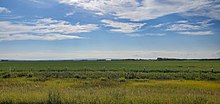51st parallel north
The 51st parallel north is a circle of latitude that is 51 degrees north of the Earth's equatorial plane. It crosses Europe, Asia, the Pacific Ocean, North America, and the Atlantic Ocean.
At this latitude the sun is visible for 16 hours, 33 minutes during the summer solstice and 7 hours, 55 minutes during the winter solstice.[1]

Capital cities between the 51st and 52nd parallels are London and Astana.
Around the world
Starting at the Prime Meridian (just north of the Sheffield Park Garden in East Sussex, England) and heading eastwards, the parallel 51° north passes through:
Russian America 1799–1824/25
In 1799 Paul I, Tsar of the Russian Empire, issued a ukase creating the Russian-American Company (RAC). It was granted monopolistic control north of the 55th parallel north, which had been the Russian claim since 1790, as well as the right to operate and occupy territory to the south as long as the lands had not been previously occupied, or dependent on any other nation.[2] In 1821 the RAC's charter was renewed and at the same time an ukase proclaimed that Russian sovereignty extended south to the 51st parallel, and that waters north of that line were closed to foreign shipping. The ukase was met with strong objections by the United States and Great Britain. Subsequent negotiations resulted in a clear and permanent boundary for Russian America, the southward terminus of which was established at 54°40′ north.[3]
See also
References
- ^ "Duration of Daylight/Darkness Table for One Year". U.S. Naval Observatory. 2019-09-24. Archived from the original on 2019-10-12. Retrieved 2021-03-10.
- ^ United States, Bering Sea Tribunal of Arbitration (1892). Fur-seal Arbitration: The Case of the United States before the Tribunal of Arbitration to convene at Paris under the provisions of the treaty between the United States of America and Great Britain, concluded February 29, 1892. United States Government Printing Office. p. 14. OCLC 68198841.
- ^ Haycox, Stephen W. (2002). Alaska: An American Colony. University of Washington Press. pp. 1118–1122. ISBN 978-0-295-98249-6.


